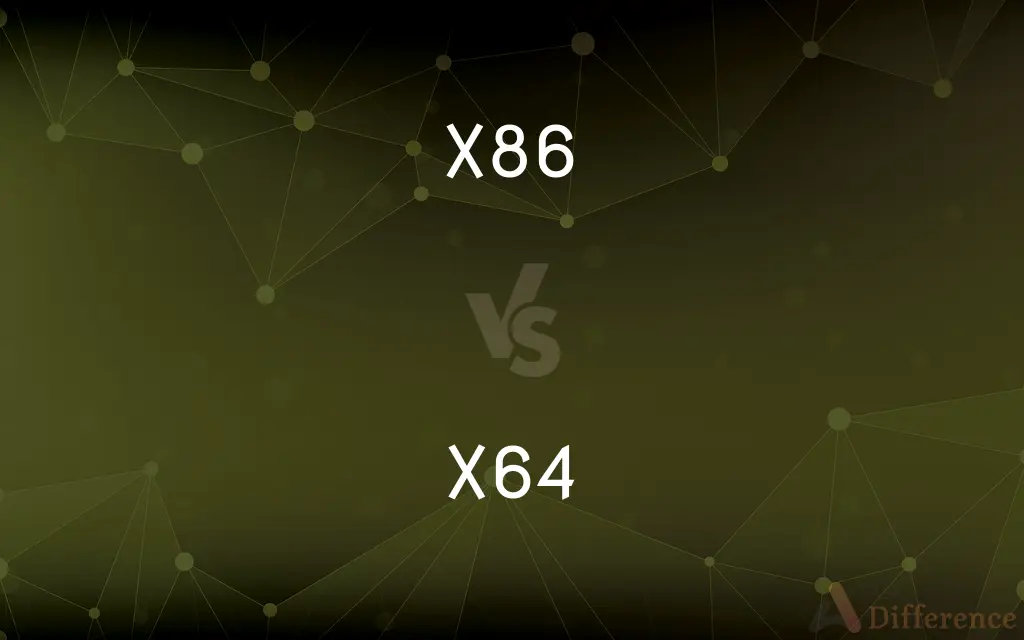X86 vs. X64 — What's the Difference?
Edited by Tayyaba Rehman — By Fiza Rafique — Published on November 4, 2023
X86 refers to a 32-bit instruction set architecture, while X64 refers to a 64-bit instruction set architecture, both originating from Intel processors.

Difference Between X86 and X64
Table of Contents
ADVERTISEMENT
Key Differences
X86, as a term, originated from Intel's 8086 microprocessor lineage, representing 32-bit processing. X64, in contrast, signifies a 64-bit processing architecture, which can manage more data and larger memory addresses.
Both X86 and X64 relate to how a computer's processor manages data and memory. While X86 is limited by a 32-bit address space, X64 can accommodate a far larger 64-bit address space, allowing for enhanced system performance.
Historically, X86 architecture dominated the computing world for a significant period. However, with the increasing demand for more robust computing capabilities, X64 architecture, offering more RAM and faster processing, began to gain traction.
Software compatibility differs for X86 and X64. Applications designed for X86 may not fully leverage the capabilities of X64 systems. Conversely, X64 applications might not run on X86 systems without emulation.
It's essential to note that while X86 processors are gradually becoming obsolete due to their limitations, X64 processors have become the standard in modern computing, catering to the needs of today's software and multitasking demands.
ADVERTISEMENT
Comparison Chart
Bit Architecture
32-bit
64-bit
Memory Addressing Capability
Limited to 4GB
More than 4GB, typically up to 18.4 million TB
Historical Origin
Derived from Intel's 8086 microprocessor
Extension of X86 to support 64-bit processing
Software Compatibility
Typically supports 32-bit applications
Supports 64-bit applications, can run 32-bit apps with compatibility mode
Current Relevance
Becoming obsolete
Standard in modern computing
Compare with Definitions
X86
X86 denotes a 32-bit computing architecture.
Most older computers operate on X86 architecture.
X64
X64 can support a vast memory address space.
X64 systems can efficiently handle large RAM sizes and applications.
X86
X86 primarily supports 32-bit software.
I need to check if this software is compatible with my X86 system.
X64
X64 refers to 64-bit computing architecture.
My new laptop boasts an X64 processor for improved performance.
X86
X86 has a memory limit of 4GB.
X86 systems can't utilize RAM beyond 4GB.
X64
X64 is an extension of the X86 architecture to support 64-bit processing.
X64 architecture evolved from the limitations of X86.
X86
X86 processors are less prevalent in modern devices.
It's becoming hard to find new PCs with pure X86 processors.
X64
X64 systems can run both 32-bit and 64-bit software.
My X64 computer can execute older 32-bit applications without issues.
X86
X86 is derived from Intel's 8086 processor series.
Intel's 8086 was a pioneering chip that led to the X86 naming.
X64
X64 has become the modern computing standard.
For multitasking and modern software, X64 processors are ideal.
X86
(computing) Any of a family of instruction set architectures based on that used by the Intel 8086 microprocessor.
X64
(computing) x86-64
X86
Specifically, the 32-bit version of the x86 instruction set architecture.
The x86 version of Windows 7 only supports a maximum of 4 GiB of RAM; 64-bit Windows can support a lot more.
X86
(rare) Specifically, the original, 16-bit version of the x86 instruction set architecture.
Common Curiosities
How does X64 differ from X86?
X64 is a 64-bit instruction set architecture, whereas X86 is 32-bit.
What does X86 stand for?
X86 refers to the 32-bit instruction set architecture, deriving its name from Intel's 8086 processor.
Do X64 processors handle more RAM than X86?
Yes, X64 processors can manage a memory address space much larger than the 4GB limit of X86.
Which architecture is more efficient: X86 or X64?
X64 is generally more efficient due to its ability to handle more data and larger memory addresses.
Is X64 an evolution of X86?
Yes, X64 is an extension of the X86 architecture to support 64-bit processing.
Are X86 applications becoming obsolete?
While many developers now focus on 64-bit applications, X86 applications are still in use, especially in older systems.
Can X86 systems run X64 software?
Typically, X86 systems cannot run X64 software without emulation.
Can modern computers still operate on X86?
While most modern PCs use X64, some devices, especially older ones, still operate on X86.
Does the "64" in X64 mean it's twice as powerful as X86?
Not necessarily. "64" refers to the bit architecture, meaning it can process more data at once and handle larger memory, but it doesn't denote double the power.
Do X64 processors only run 64-bit applications?
No, X64 processors can typically run both 32-bit and 64-bit applications.
Which is more prevalent in modern computers: X86 or X64?
X64 is more prevalent in modern computers due to its enhanced capabilities and support for current software demands.
Can I upgrade my X86 system to X64?
Hardware-wise, this would require a new processor and possibly other components. Software-wise, a new 64-bit OS installation would be needed.
Why did the computing world transition from X86 to X64?
The transition occurred primarily due to X64's ability to handle more RAM and offer faster processing capabilities.
Are all modern software designed for X64?
Most modern software is designed for X64, but many also offer X86 versions for compatibility.
Do I need to choose software based on my system's architecture?
Yes, ensuring software compatibility with your system's architecture (X86 or X64) is crucial for optimal performance.
Share Your Discovery

Previous Comparison
Centre of Gravity vs. Centroid
Next Comparison
Weak Base vs. Strong BaseAuthor Spotlight
Written by
Fiza RafiqueFiza Rafique is a skilled content writer at AskDifference.com, where she meticulously refines and enhances written pieces. Drawing from her vast editorial expertise, Fiza ensures clarity, accuracy, and precision in every article. Passionate about language, she continually seeks to elevate the quality of content for readers worldwide.
Edited by
Tayyaba RehmanTayyaba Rehman is a distinguished writer, currently serving as a primary contributor to askdifference.com. As a researcher in semantics and etymology, Tayyaba's passion for the complexity of languages and their distinctions has found a perfect home on the platform. Tayyaba delves into the intricacies of language, distinguishing between commonly confused words and phrases, thereby providing clarity for readers worldwide.
















































